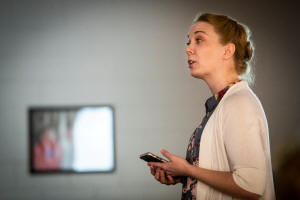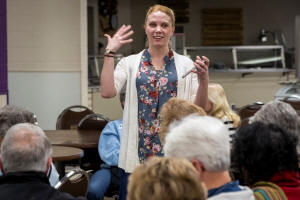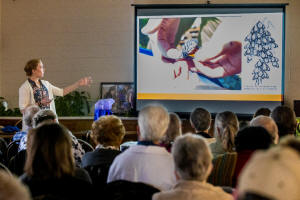|
 Guests
at Russel Allen Garden Day broaden knowledge and skills Guests
at Russel Allen Garden Day broaden knowledge and skills
Part Three: Revitalizing Monarch habitat in rural landscapes
 Send a link to a friend
Send a link to a friend
[March 15, 2019]
LINCOLN
- As the keynote speaker in the final hour of the day, Assistant
Professor of Science at Lincoln College, Dr. Julia Ossler, presented
a program she had entitled does nature need cities. She said she
found the title intriguing because the common first response of most
people would be no, nature does not need cities, and furthermore is
harmed by cities.
|
|
 However, Dr. Ossler said that was not necessarily the
case. The key is for cities to promote nature within their
boundaries through productive use of their green spaces. However, Dr. Ossler said that was not necessarily the
case. The key is for cities to promote nature within their
boundaries through productive use of their green spaces.
Speaking specifically about increasing the population of milkweed
throughout the state for the benefit of the monarch population,
Ossler spoke about work being done to cultivate the plant in urban
areas.
Ossler explained that the monarch population is dependent upon
milkweed specifically for its regeneration. The milkweed is needed
for the feeding and development of the caterpillar stage of the
monarch.

Lincoln College has partnered with Field Museum in
Chicago to work on a study concerning milkweed and monarchs. Ossler
said that looking specifically at Chicago, work had been done to
determine what the milkweed potential was in the large metropolitan
area. The GPS modeling used to show concrete surfaces and buildings
along with green spaces had at first been depressing. She said the
initial models showed little potential for cultivation of plants
because there were practically no greenspaces.

However, when the team started working with the many variables that
could exist in Chicago, such as buildings with rooftop garden
potential and landscaping around buildings, plus landscape in
residential areas, they discovered that Chicago had the greenspace
potential to provide all the milkweed needed for monarch
regeneration. That was surprising and exciting.
Another surprise was when the teams began doing studies in the
downstate regions. Ossler said that it was expected that the
hometown community would be high in milkweed production because it
was a small agricultural community with lots of greenspace and lots
of potential. However, the study showed that milkweed in Lincoln and
in Logan County was all but non-existent.
Moving farther south the team worked in the area of Carbondale, and
again they were shocked by the results. It turns out that Carbondale
has a reasonably high population of milkweed. Ossler said the team
had felt that Lincoln would surely do better than Carbondale, but
the larger community to the south had blown Lincoln out of the
water.
Ossler said that there are plans to further research what is going
on in Carbondale. Results found there may provide some guidance for
other rural communities.
Ossler also provided a handout in the guest bags that
shows the plants that are helpful to the monarch populations. These
are plants that include a variety of milkweed, but also other
flowering plants that the adult monarch feed off of through their
life cycle. The handout is part of the research done with the Field
Museum and can be found on the museum website following this link -
https://fieldguides.fieldmuseum.org/ sites/
default/files/rapid-color-guides-pdfs/
878_usa_monarch_habitat_garden.pdf

[to top of second column] |

The museum also has a page named
Monarch Butterflies 101 that explains the life cycle and
migration of the butterflies.

Ossler said the students at Lincoln College have been very excited
to be a part of this project and are working hard to make a
contribution. She said that one of the issues facing the Monarch
butterfly is its designation as an endangered species. The Monarch
is currently on the national endangered species list, but, that
designation is about to expire. Ossler said when she told her
students that the work they were doing would be used this year to
re-submit the Monarch for the endangered designation it was quite
sobering for all of them, as they realized the impact they could
have on the future of the butterfly.
For some in the audience this was also a sobering fact, and for some
a source of pride and enthusiasm to think that our small town
college is involved in something that is so important to the balance
of nature.
Ossler also spoke briefly about a project called,
All Hands on Deck, to restore Monarch habitat backed by the
Monarch Butterfly Fund and suggested that everyone visit the webpage
and consider trying to help out.
As she wrapped up her discussions, Ossler also mentioned the need to
preserve other pollinator insects and talked about a new program
called “bee cities.” She said that to have a bee city would involve
getting support from the local governing bodies. One person in the
audience commented that the bee city might not be possible in this
area because of the spraying for mosquitos. She noted that the city
doesn’t have total control over that spraying, they are mandated by
the state to spray when mosquitos reach certain populations. Ossler
said that was true, but there might still be actions that could be
taken. She said she would be interested in talking with anyone who
was willing to take on a bee city project. In the meantime, she said
students at LC are working toward come other bee designations to
help promote plant life that will support and encourage pollinator
insects.

With time running out, Ossler brought the day to a close opening the
floor for questions and comments, and thanked everyone for
attending.
Outside the rain was falling in buckets and the skies were gray, but
as the crowd prepared to exit, rain was better than snow. Spring is
just around the corner, and they were now better equipped to tackle
those spring garden projects.
The Russel Allen Garden day is one of two large fundraisers for the
Logan County Master Gardeners. The next big fundraiser will be the
spring plant sale, which is scheduled for May 11th from 8 a.m. to
noon in the Special Events building at the Logan County Fairgrounds
in Lincoln. The sale day coincides with the opening of the ALMH
Market, also at the fairground in the Expo building.
Be sure to mark your calendar for both events!
[Nila Smith with Photos by Mark
Gordon, Lincoln College] |